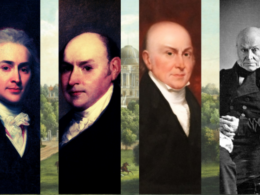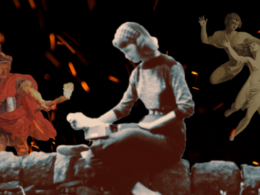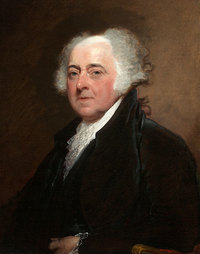
This spring Library of America releases John Adams: Writings from the New Nation 1784–1826, the third and final volume of Gordon S. Wood’s landmark edition of the great patriot’s works. It includes letters, diary excerpts, political essays, and presidential messages illuminating Adams’s service as a diplomat in the Netherlands and England, his eight years as vice president under Washington, and his tumultuous single term as president; selections from A Defence of the Constitutions of Government of the United States of America and Discourses on Davila, demonstrating his insights into the strengths and weaknesses of ancient and modern political systems; and, from his long retirement, brilliant letters to a roster of correspondents that includes Thomas Jefferson, Benjamin Rush, and his son, John Quincy Adams.
This volume joins the previously published John Adams: Revolutionary Writings 1755–1775 and John Adams: Revolutionary Writings 1775–1783, which gather the essential early writings of the man Jefferson called the “Colossus” of Independence, including his revealing letters to his “Dearest Friend” Abigail and the complete Novanglus-Massachusettensis newspaper exchange, a crucial episode in the coming of the American Revolution.
To mark the event, Library of America sat down with editor Gordon Wood, Alva O. Way Professor of History Emeritus at Brown University and the Pulitzer Prize‒winning author of The Radicalism of the American Revolution, to discuss Adams’s complicated legacy, and the enduring appeal of his writings. Wood also edited the two-volume Library of America collection The American Revolution: Writings from the Pamphlet Debate 1764–1776 in 2015, and in 2011 he was awarded the National Humanities Medal by President Barack Obama.
LOA: You have written that “none of the other Founders passed on such a rich and revealing body of personal documents as Adams did.” What makes Adams’s writings so different from those of the other Founders?
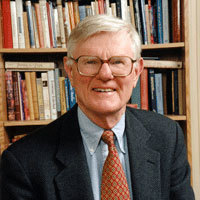
Wood: Adams was the best and most colorful stylist among the Founders. Although Jefferson is widely regarded as the smoothest writer, Adams is by far the most engaging and imaginative. His vividly descriptive prose is supremely quotable. Adams wears his heart on his sleeve and reveals all of his ambitions, doubts, and insecurities, especially in his diary, which is one of the greatest and most readable in all of American literature. Take for instance these diary entries from 1759, when Adams was a twenty-three-year-old lawyer: “Reputation ought to be the perpetual subject of my Thoughts, and Aim of my Behaviour. How shall I gain a Reputation! How shall I Spread an Opinion of myself as a Lawyer of distinguished Genius, Learning, and Virtue. . . . What am I doing? Shall I sleep away my whole 70 years. No by every Thing I swear I will renounce the Contemplative, and betake myself to an active roving Life by Sea or Land, or else I will attempt some uncommon unexpected Enterprize in Law. . . . I will watch my Opportunity, to speak in Court, and will strike with suprize—suprize Bench, Bar, Jury, Auditors and all.” No other Founder revealed his ambition in this manner.
LOA: Benjamin Franklin once described Adams as a man who “means well for his Country, is always an honest Man, often a Wise One, but sometimes and in some things, absolutely out of his senses.” Does this description tell us more about Adams, or Franklin?
Wood: Adams never hid his jealousy and resentment of the other Founders, especially Benjamin Franklin. In 1782 he wrote to an English friend about Franklin, who, he said, “must make himself a Man of Consequence by piddling with Men who had no Title. . . . But thus it is, that Men of great Reputations may do as many Weak Things as they please, and to remark their Mistakes is to envy them. . . . His base Jealousy of me and his Sordid Envy of my Commission for making Peace . . . have Stimulated him to attempt an assassination upon my Character.” Franklin no doubt knew of Adams’s opinion of him, but what probably led to Franklin’s remark was Adams’s letters to the chief French minister, the Comte de Vergennes, in which he repeatedly lectured him on how he ought to treat the United States.
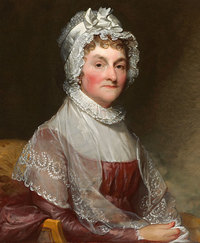
LOA: Abigail Adams was the great love—and correspondent—of Adams’s life. Because they were apart for so much of their lives they exchanged more than a thousand letters. How different is the Adams in the letters to Abigail from the Adams we see in his other letters, diary, and autobiography?
Wood: Adams’s letters to Abigail are wonderful. In his letters he is loving, humorous, preachy, learned, and saucy. He speaks to her with almost complete abandon, revealing all of his sensuous and vulnerable nature. His letters to others are more circumspect. His diary, of course, is even more revealing of his feelings. Both his letters to Abigail and his diary tell us what he really thinks about people and events. His letters courting Abigail Smith are especially priceless. In one of 1764 he addresses her as “Miss Adorable” and says that “By the same Token that the Bearer hereof satt up with you last night I hereby order you to give him, as many Kisses, and as many Hours of your Company after 9 O’Clock as he shall please to Demand and charge them to my Account.” In another of 1763 he tells her that “I mount this moment for that noisy, dirty Town of Boston, where Parade, Pomp, Nonsense, Frippery, Folly, Foppery, Luxury, Polliticks, and the soul-Confounding Wrangles of the Law will give me the Higher Relish for Spirit, Taste and Sense, at Weymouth, next Sunday.” With letters like these it is not surprising that she agreed to marry him.
LOA: Adams filled his letters with colorful details. In his Pulitzer Prize–winning biography of Adams, David McCullough wrote “In another time, under different circumstances, [Adams] might have become a great novelist.” Do you have favorite passages in which he demonstrates this talent?
Wood: McCullough is correct. Here, for example, is Adams’s private description of his Braintree minister:
“P[arson] W[ibird] is crooked, his Head bends forward. . . . His Nose is a large roman Nose with a prodigious Bunch Protuberance, upon the upper part of it. His Mouth is large, and irregular, his Teeth black and foul, and craggy. . . . His Eyes are a little squinted, his Visage is long, and lank, his Complexion wan, his Cheeks are fallen, his Chin is long, large, and lean. . . . When he prays at home, he raises one Knee upon the Chair, and throws one Hand over the back of it. With the other he scratches his Neck, pulls the Hair of his Wigg. . . . When he Walks, he heaves away, and swaggs on one side, and steps almost twice as far with one foot, as with the other. . . . When he speakes, he cocks and rolls his Eyes, shakes his Head, and jerks his Body about.”
Henry Fielding could not have done better.
LOA: Adams had occasion to work closely with Franklin, Jefferson, and Washington in the Continental Congress—and even more closely with Franklin and Jefferson on his diplomatic missions abroad. What portraits of the other Founders emerge from Adams’s writings? How accurate or skewed do you think they are?
Wood: Actually I think his descriptions of the personalities of Franklin and Jefferson and others were pretty accurate. It is only when he felt he was wronged by them that he lets loose his anger and resentment. He is impressed with Jefferson’s learning, but noted his silence during the debates in the Congress: “I never heard him utter three Sentences together.” His description of Franklin in a letter to Abigail in 1775 is laudatory. Only when he experiences all the adulation paid to Franklin in Paris does he begin to change his tune. Franklin may be a great philosopher, he told his diary in 1779, but “as a Legislator in America he has done very little.” By 1782 he had come to feel for Franklin “no other sentiments than Contempt or Abhorrence.”
LOA: “The Resolution on Establishing New Governments,” dated May 15, 1776, that Adams submitted to the Continental Congress lays out the grievances the colonies had against the Crown in language strikingly similar to that finally included in the Declaration of Independence. Does Adams get too little credit for what he contributed to that document?
Wood: I think Adams was correct when he said that his May resolutions were “an Epocha, a decisive Event,” and tantamount to a declaration of independence. As he told Abigail on May 17, 1776, “I have Reasons to believe that no Colony, which shall assume a Government under the People, will give it up. There is something very unnatural and odious in a Government 1000 Leagues off.” He always felt that his contribution to bringing about independence went unappreciated, especially after the 1790s when Jefferson began to be lauded as the “author” of the Declaration of Independence. After all, the Declaration was a committee report, and Jefferson was simply the draftsman. Adams’s crucial role in bringing about independence in the Continental Congress has tended to get forgotten.
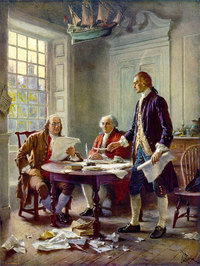
LOA: On July 3, 1776, the day after twelve of the thirteen colonies voted for independence, Adams wrote to Abigail: “Yesterday the greatest Question was decided, which ever was decided in America, and a greater perhaps, never was or will be decided among Men.” But Adams’s grand vision, enthusiasm, and expectations for the country sour somewhat over the years. Can we trace the path and cause of that change in his writings?
Wood: Certainly. Adams never had an optimistic view of human nature, and his experience in the Congress and abroad only deepened his suspicion that his fellow Americans might not have the character to sustain a republican government. As early as 1776 he expressed his doubts about America’s capacity for virtue. “I have seen all along my Life, Such Selfishness, and Littleness even in New England, that I sometimes tremble to think that, altho We are engaged in the best Cause that ever employed the Human Heart, yet the Prospect of success is doubtfull not for Want of Power or of Wisdom, but of Virtue.” By the time he came to write his Defence of the Constitutions of the United States in 1787 he had as dark a view of the American character as that of any critic in our history.
LOA: Adams spent the great bulk of those intervening years abroad. Except for a short three-month visit home in 1779, he was occupied with diplomatic missions in Europe for most of the war years and all of the Confederation period. What effect did this long absence from the American scene have on the evolution of his political thought?
Wood: I think he developed a much deeper suspicion of France and the other European powers than he had earlier. He lost much if not all of the utopian thinking about international politics and diplomacy expressed in his Model Treaty of 1776 and became much more cynical about the world. “America,” he said in 1781, “is treated unfairly and ungenerously by Europe.” But what could one expect? “When Nations are corrupted, and grown generally vicious when they are intoxicated with Wealth or Power, and by this means delivered over to the Government of the baser Passion of their Nature, it is very natural that they should act an irrational part.”
Adams’s perception of Europe, and especially France, was clearly different than Jefferson’s. For Jefferson the luxury and sophistication of Europe only made American simplicity and virtue appear dearer. For Adams, by contrast, Europe represented what America was fast becoming—a society consumed by luxury and vice and fundamentally riven by a struggle between rich and poor, gentlemen and commoners. His experience with the French philosophes only convinced him further of the need for a bicameral legislature representing the two principal social orders and, equally important, an independent executive.
Perhaps more significant than his experience in Europe, though, was Adams’s experience in his own country, and his extensive reading on the history of the English constitution. In 1779 he had an opportunity to try out his ideas by framing the Massachusetts constitution.
LOA: Speaking of which, Adams’s 1779 “Report of a Constitution or Form of Government for the Commonwealth of Massachusetts” is the oldest working government charter in the world. What about this document explains its enduring effectiveness?
Wood: The Massachusetts constitution was written much later than the other revolutionary state constitutions, and thus it avoids some of the earlier mistakes. The executive is stronger, with a limited veto; the senate is more formidable; and the judiciary is independent. It resembles the federal Constitution of 1787 more closely than any of the other revolutionary state constitutions. It was also drawn up by a special convention, and it provided for popular ratification—practices that were followed by the drafters of the federal Constitution of 1787 and subsequent state constitution-makers.
LOA: In 1782 Adams succeeded in getting the Netherlands to recognize the American republic and, perhaps even more remarkable, secured a two-million-dollar loan from the Dutch bankers, achievements Adams considered the greatest diplomatic triumphs of his life. How important was this loan to the finances of the infant republic? Do his letters help us understand how he pulled off these improbable feats?
Wood: This was a very significant achievement, and one that Adams had every right to be proud of. Not only was the loan essential to America’s financial survival, but getting the Netherlands to recognize the fledgling republic was crucial in establishing America’s position in the world. Adams’s letters reveal his persistence and determination to win over the Dutch against all odds and to convince them and the other peoples of Europe of the potential greatness of the United States and of the importance of the Revolution to the world. Americans, he wrote in 1780, believed that their “revolution is as much for the benefit of the generality of Mankind in Europe, as for their own.”
LOA: Writings from the New Nation 1784‒1826 includes excerpts from Adams’s two longer works, A Defence of the Constitutions and Discourses on Davila. What was his objective in writing these works?
Wood: Adams said his objective in writing his Defence of the Constitutions of the United States and his Davila essays was to counter what he thought was the unfair criticism of the American state constitutions made by the French philosophes, especially Turgot. They had indicted the United States for slavishly copying the English constitution by erecting bicameral legislatures in their state constitutions, most drafted in 1776. Creating senates, the French critics said, implied that there was another social order besides the people represented in the houses of representatives. Adams actually agreed with that implication and argued that the aristocracy and the people had to have separate houses; this was the only way the power of the aristocracy could be contained. His countrymen agreed with the idea of bicameralism, but came to believe that both legislative houses were simply different kinds of representations of the people. Since the American governments, including the new federal government of 1787, did have bicameral legislatures and independent executives, it was difficult for many contemporaries (and subsequent historians) to see what the confusion was all about.
But Adams was arguing that a separate social order existed that needed to be embodied in senates and his fellow Americans could not accept this and accused him rightly of being obsessed with the English constitution. Adams identified himself with the political theories of Harrington, Locke, and Montesquieu, whose ideas of constitutionalism, he believed, were applicable to all peoples everywhere; they were his contribution to what he called “the divine science of politics.”
LOA: While Adams did not participate in the framing of the Constitution, should we give more credit to his influence on how it turned out?
Wood: I think his influence on the federal Constitution was indirect. Many including James Madison mocked the first volume of Adams’s Defence of the Constitutions of the United States in 1787. But his Massachusetts constitution was a model for those who thought about stable popular governments, with its separation of powers, its bicameral legislature, its independent judiciary, and its strong executive. So it was his Massachusetts constitution if anything that influenced people. It was not the structure of Adams’s balanced government that offended people; it was his attempt to justify that structure by the traditional notion of social estates—that the executive represented the monarchical estate, the senate the aristocratic estate, and the house of representatives the estate of the people. This rationale, which justified the mixed constitution of Great Britain, might have made some sense in 1776, but by 1787 most American thinkers had come to believe that all parts of their balanced governments represented in one way or another the sovereign people. They had left the Aristotelian idea of mixed estates—monarchy, aristocracy, and democracy—way behind. Adams had not, and his stubbornness on this point caused him no end of trouble.
LOA: Adams and Jefferson, whose friendship ruptured amid the partisan strife of the 1790s, famously reconciled late in life, and engaged in a lively correspondence, much of which is included in this third volume. How would you characterize the relationship between the two?
Wood: The relationship between Adams and Jefferson was extraordinary. They differed on every conceivable issue, except on the Revolution and the love of their country. Their shared experience in 1775‒1776 in bringing about the separation from Britain and their service in Europe cemented a friendship that in the end withstood the most serious political and religious differences that one could imagine, especially their differences over the French Revolution. It was probably Jefferson’s obsession with politeness and civility that kept the relationship from becoming irreparably broken. After Jefferson’s defeat of Adams in the presidential election of 1800, they didn’t communicate with one another for more than a decade. A mutual friend, Benjamin Rush, brought them together in 1812, and they went on to exchange letters for the rest of their lives. But in their correspondence they tended to avoid the most controversial issues, such as slavery. Again and again Jefferson deftly sidesteps many of Adams’s often provocative remarks. They both felt the correspondence, which was written for posterity, was too important to risk by being too candid with one another.
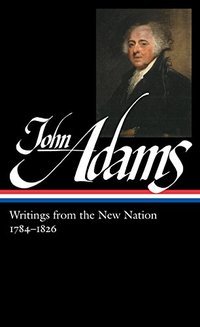
LOA: It has become a commonplace in American politics today to call the United States an exceptional nation. Would Adams have agreed?
Wood: Jefferson believed that the United States was a chosen nation with a special responsibility to spread democracy around the world. More than any other figure in our history Jefferson is responsible for the idea of American exceptionalism. Adams could not have disagreed more. Deeply versed in history, he said over and over that America had no special providence, no special role in history, that Americans were no different from other peoples, that the United States was just as susceptible to viciousness and corruption as any other nation. In this regard, at least, Jefferson’s vision has clearly won the day.
